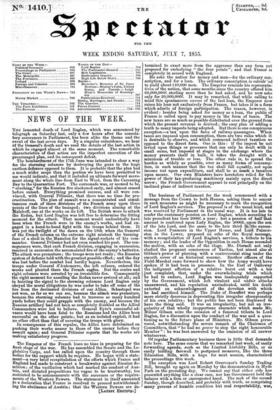The Emperor of the French loses no time in preparing
for the fresh stage of the war. He has assembled the Senate and the Le- gislative Corps, and has called upon the country through those bodies for the support which he requires. He began with a state- ment—a very brief recapitulation of the efforts which France and England had made to construct a breakwater against Russian do- munon ; of the vacillation which had marked the conduct of Aus- tria, and dictated propositions too vague to be trustworthy, too restricted to be commensurate with the successes or the require- ments of the Western Powers. The statement in itself amounted to a declaration that France is resolved to proceed notwithstand- ing the abstinence of Austria ; that the Western Powers are de- termined to exact more from the aggressor than any form yet proposed for embodying "the four points "; and that France is completely in accord with England.
He asks the nation for money and men—for the ordinary con- scription, and for a loan. The ordinary conscription is calcule,ed to yield about 140,000 men. The Emperor reminds his representa- tives of the nation, that some months since the country offered him 68,000,000/. sterling more than he had asked, and he now asks only for 30,000,000/. It may be remarked, that while calling to mind this spontaneous excess of the last loan, the Emperor now raises his loan not exclusively from France, but takes it in a form which admits of foreign participation. The reason' however, is evident : besides being asked for money as a loan, the public of France is called upon to pay money in the form of taxes. The new taxes are as much as possible distributed over the ground from which the present revenue is derived ; the easy plan of adding a tenth to many imposts being adopted. But there is one conspicuous exception—a tax upon the fares of railway-passengers. When taxes are imposed upon consumption, there are two rules which it is desirable to observe, and which commend indirect taxation as opposed to the direct form. One is this : if the impost be not levied upon things or processes that can only be dealt with in small sums, but imposed at stages in the exchange where the money presents itself in bulk, it takes the draught with a minimum of trouble or loss. The other rule is, to spread the burden as widely as possible, over as many forms of consump- tion, in such manner that the tax shall fall equably, not upon income but upon expenditure, and shall be as much a taxation upon means. Our own Ministers have heretofore relied for the power of their tax-producing machinery mainly upon the direct screw; the French Government appears to rest principally on the inclined plane of indirect taxation.


























